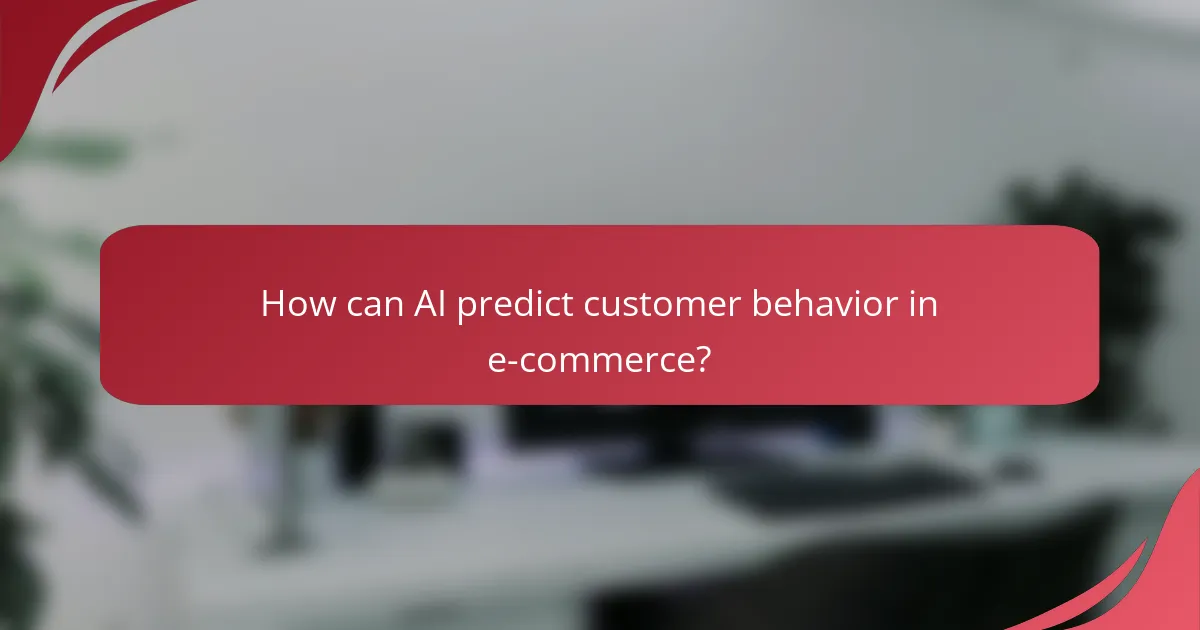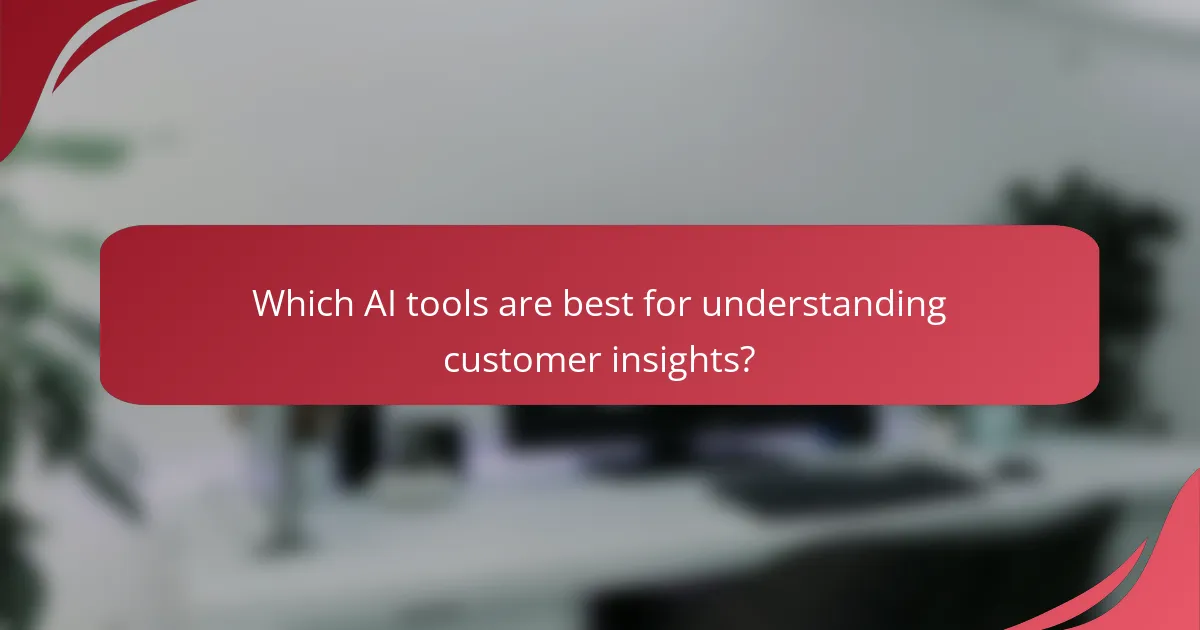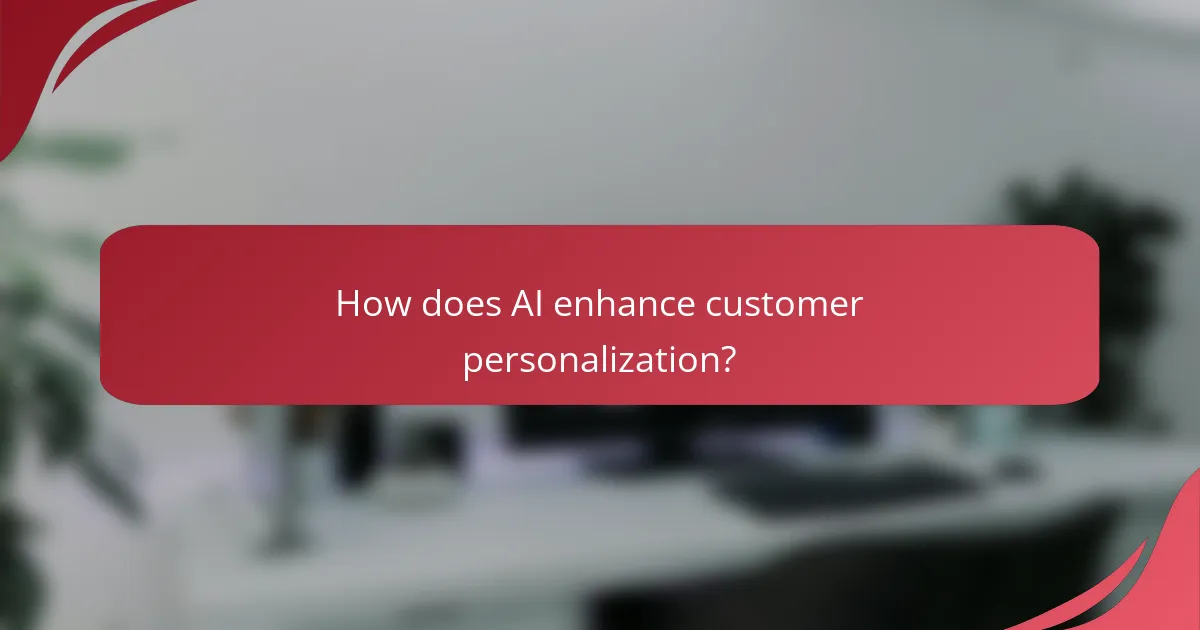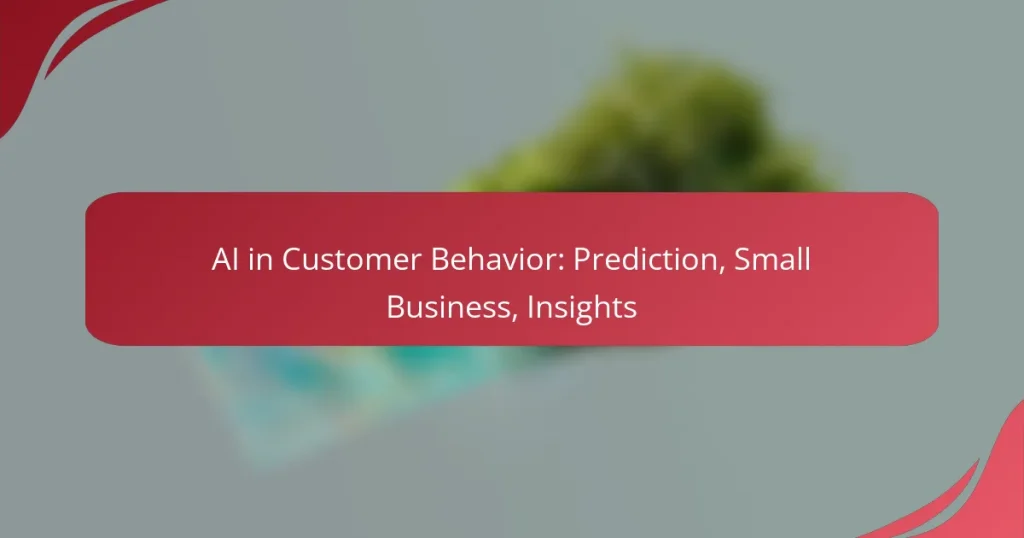Artificial intelligence is revolutionizing how businesses understand and predict customer behavior, particularly in the e-commerce sector. By analyzing extensive data sets, AI enables small businesses to tailor marketing strategies, optimize inventory, and enhance customer experiences, ultimately driving growth and efficiency.

How can AI predict customer behavior in e-commerce?
AI can predict customer behavior in e-commerce by analyzing vast amounts of data to identify patterns and trends. This predictive capability helps businesses tailor their marketing strategies, optimize inventory, and enhance customer experiences.
Machine learning algorithms
Machine learning algorithms are essential for predicting customer behavior as they can process large datasets to uncover insights. Techniques like regression analysis, decision trees, and neural networks allow businesses to model customer preferences and purchasing patterns effectively.
For instance, a retail website might use a decision tree algorithm to determine which products are likely to be purchased together, enabling targeted recommendations. Choosing the right algorithm depends on the specific data and business goals, so experimentation is key.
Predictive analytics tools
Predictive analytics tools leverage machine learning to forecast customer behavior by analyzing historical data. Tools like Google Analytics, Salesforce, and IBM Watson offer features that help businesses understand customer journeys and predict future actions.
These tools often provide visual dashboards that highlight trends and anomalies, making it easier for small businesses to make data-driven decisions. Selecting a tool should consider factors like ease of use, integration capabilities, and cost, which can range from free to several hundred dollars per month.
Customer segmentation techniques
Customer segmentation techniques involve dividing a customer base into distinct groups based on shared characteristics, which enhances prediction accuracy. Common methods include demographic segmentation, behavioral segmentation, and psychographic segmentation.
For example, a small e-commerce store might segment customers by purchase frequency or average order value, allowing for personalized marketing campaigns. Effective segmentation can lead to higher engagement rates, so businesses should regularly review and adjust their segments based on evolving customer data.

What are the benefits of AI for small businesses?
AI offers small businesses numerous advantages, including cost savings, improved customer understanding, and streamlined operations. By leveraging AI technologies, these businesses can enhance their marketing efforts, gain valuable insights into customer behavior, and optimize inventory management.
Cost-effective marketing strategies
AI can significantly reduce marketing costs by automating tasks and optimizing ad spend. For example, small businesses can use AI tools to analyze customer data and target specific demographics, leading to more effective campaigns with higher conversion rates.
Additionally, AI-driven platforms can help businesses identify the best times to post on social media or send emails, maximizing engagement without increasing costs. This targeted approach allows small businesses to allocate their budgets more efficiently.
Enhanced customer insights
AI provides small businesses with deeper insights into customer preferences and behaviors. By analyzing data from various sources, such as purchase history and online interactions, AI can identify trends and patterns that inform product offerings and marketing strategies.
For instance, businesses can use AI to segment their customer base, allowing for personalized marketing that resonates with different groups. This tailored approach can lead to increased customer loyalty and higher sales.
Improved inventory management
AI can streamline inventory management for small businesses by predicting demand and optimizing stock levels. By analyzing historical sales data and market trends, AI algorithms can forecast future inventory needs, reducing the risk of overstocking or stockouts.
Implementing AI-driven inventory systems can help businesses maintain optimal stock levels, which is crucial for minimizing costs and meeting customer demand. Regularly reviewing these AI insights ensures that small businesses remain agile in a competitive market.

Which AI tools are best for understanding customer insights?
Several AI tools excel in providing valuable customer insights, helping businesses understand behavior and preferences. Google Analytics, HubSpot, and Salesforce Einstein are among the top choices for small businesses looking to leverage AI for enhanced customer understanding.
Google Analytics
Google Analytics utilizes AI to analyze website traffic and user behavior, offering insights into customer interactions. It tracks metrics such as page views, session duration, and bounce rates, allowing businesses to identify trends and optimize their online presence.
To make the most of Google Analytics, set up goals to measure conversions and use segmentation to analyze specific customer groups. Regularly review reports to adapt marketing strategies based on user behavior patterns.
HubSpot
HubSpot combines CRM capabilities with AI-driven analytics to deliver insights into customer engagement and sales performance. It provides tools for tracking email campaigns, social media interactions, and website behavior, helping businesses tailor their marketing efforts.
Utilize HubSpot’s reporting features to monitor key performance indicators (KPIs) and customer journey stages. Regularly update your contact lists and segment audiences to improve targeting and personalization in your campaigns.
Salesforce Einstein
Salesforce Einstein integrates AI into the Salesforce platform, offering predictive analytics and customer insights. It analyzes data from various sources to forecast customer behavior and recommend actions to improve sales outcomes.
Take advantage of Einstein’s automation features to streamline customer interactions and enhance lead scoring. Ensure your data is clean and well-organized to maximize the effectiveness of the AI insights generated.

How does AI enhance customer personalization?
AI enhances customer personalization by analyzing data to tailor experiences and recommendations to individual preferences. This technology enables businesses to create more relevant interactions, ultimately improving customer satisfaction and loyalty.
Dynamic content recommendations
Dynamic content recommendations use AI algorithms to analyze customer behavior and preferences in real-time. By evaluating past purchases, browsing history, and demographic data, businesses can suggest products or services that align with individual interests. For example, an online clothing retailer might recommend outfits based on previous purchases or items viewed, increasing the likelihood of conversion.
To implement dynamic content effectively, ensure your data collection methods are robust and compliant with privacy regulations, such as GDPR. Regularly update your recommendation algorithms to reflect changing trends and customer feedback.
Behavioral targeting
Behavioral targeting involves using AI to segment customers based on their online behavior, allowing for tailored marketing strategies. This approach can include personalized ads that follow users across platforms, targeting them with products they have shown interest in. For instance, if a customer frequently visits a specific category on a website, they may receive targeted promotions for those products.
To maximize the effectiveness of behavioral targeting, maintain a balance between personalization and privacy. Clearly communicate how customer data is used and provide options for users to manage their preferences.
Automated email marketing
Automated email marketing leverages AI to send personalized messages based on customer behavior and preferences. This can include welcome emails, product recommendations, or re-engagement campaigns tailored to individual customer journeys. For example, a customer who abandoned their cart might receive a reminder email with a discount offer to encourage completion of the purchase.
When setting up automated email campaigns, segment your audience to ensure messages are relevant. Monitor engagement metrics to refine your approach and avoid overwhelming customers with excessive communication.

What are the challenges of implementing AI in small businesses?
Small businesses face several challenges when implementing AI, including data privacy concerns, high initial investments, and a lack of technical expertise. Addressing these issues is crucial for successful integration and maximizing the benefits of AI technologies.
Data privacy concerns
Data privacy is a significant challenge for small businesses using AI, as they often handle sensitive customer information. Compliance with regulations like GDPR in Europe or CCPA in California requires robust data protection measures, which can be daunting for smaller firms.
To mitigate these concerns, businesses should implement transparent data collection practices and ensure customers are informed about how their data will be used. Regular audits and adopting encryption technologies can further enhance data security.
High initial investment
The initial investment for AI technologies can be substantial, often requiring thousands of dollars for software, hardware, and training. Small businesses may struggle to allocate budget for these expenses, especially when cash flow is tight.
To manage costs, consider starting with affordable AI tools or platforms that offer scalable solutions. Many cloud-based AI services operate on a subscription model, allowing businesses to pay as they grow.
Lack of technical expertise
Many small businesses lack the in-house technical expertise needed to implement and maintain AI systems effectively. This gap can hinder the deployment of AI solutions and limit their potential benefits.
To overcome this challenge, small businesses can invest in training programs for existing staff or partner with external consultants who specialize in AI. Additionally, leveraging user-friendly AI tools that require minimal technical knowledge can help bridge the expertise gap.


